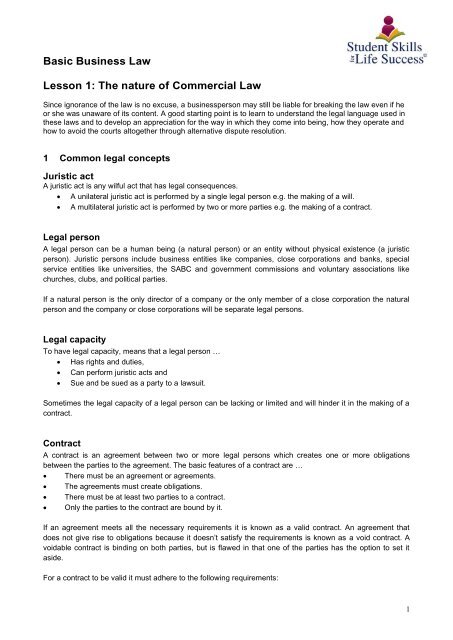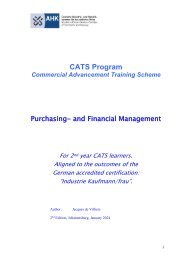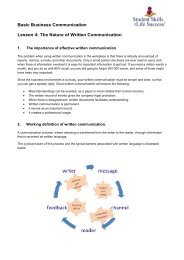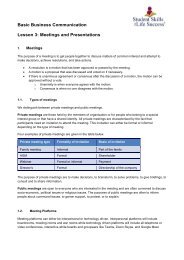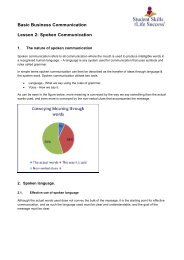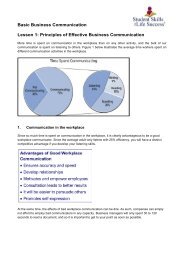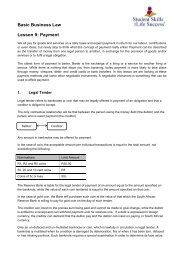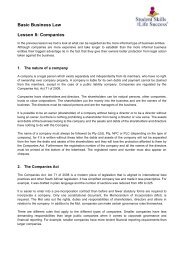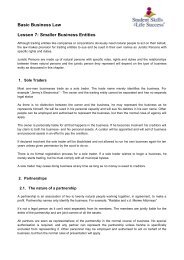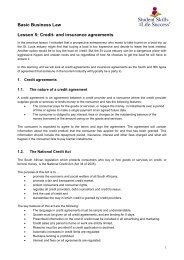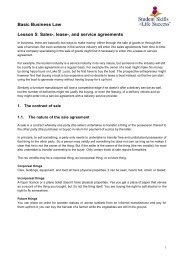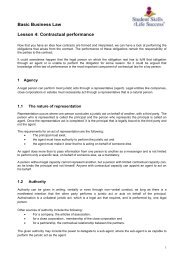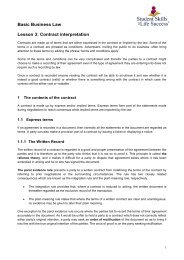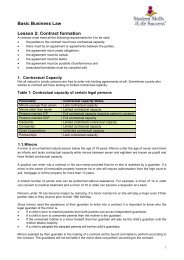Basic Business Law. Lesson 1. The nature of Commercial Law
This is the first lesson of the "Student Skills for Life Success" "Basic Business Law" course. The topics covered in this booklet are: 1. Common legal concepts 2. Civil Proceedings 3. South African Courts 4. The sources of South African law 5. Alternative dispute resolution
This is the first lesson of the "Student Skills for Life Success" "Basic Business Law" course. The topics covered in this booklet are:
1. Common legal concepts
2. Civil Proceedings
3. South African Courts
4. The sources of South African law
5. Alternative dispute resolution
Create successful ePaper yourself
Turn your PDF publications into a flip-book with our unique Google optimized e-Paper software.
<strong>Basic</strong> <strong>Business</strong> <strong>Law</strong><br />
<strong>Lesson</strong> 1: <strong>The</strong> <strong>nature</strong> <strong>of</strong> <strong>Commercial</strong> <strong>Law</strong><br />
Since ignorance <strong>of</strong> the law is no excuse, a businessperson may still be liable for breaking the law even if he<br />
or she was unaware <strong>of</strong> its content. A good starting point is to learn to understand the legal language used in<br />
these laws and to develop an appreciation for the way in which they come into being, how they operate and<br />
how to avoid the courts altogether through alternative dispute resolution.<br />
1 Common legal concepts<br />
Juristic act<br />
A juristic act is any wilful act that has legal consequences.<br />
• A unilateral juristic act is performed by a single legal person e.g. the making <strong>of</strong> a will.<br />
• A multilateral juristic act is performed by two or more parties e.g. the making <strong>of</strong> a contract.<br />
Legal person<br />
A legal person can be a human being (a natural person) or an entity without physical existence (a juristic<br />
person). Juristic persons include business entities like companies, close corporations and banks, special<br />
service entities like universities, the SABC and government commissions and voluntary associations like<br />
churches, clubs, and political parties.<br />
If a natural person is the only director <strong>of</strong> a company or the only member <strong>of</strong> a close corporation the natural<br />
person and the company or close corporations will be separate legal persons.<br />
Legal capacity<br />
To have legal capacity, means that a legal person …<br />
• Has rights and duties,<br />
• Can perform juristic acts and<br />
• Sue and be sued as a party to a lawsuit.<br />
Sometimes the legal capacity <strong>of</strong> a legal person can be lacking or limited and will hinder it in the making <strong>of</strong> a<br />
contract.<br />
Contract<br />
A contract is an agreement between two or more legal persons which creates one or more obligations<br />
between the parties to the agreement. <strong>The</strong> basic features <strong>of</strong> a contract are …<br />
• <strong>The</strong>re must be an agreement or agreements.<br />
• <strong>The</strong> agreements must create obligations.<br />
• <strong>The</strong>re must be at least two parties to a contract.<br />
• Only the parties to the contract are bound by it.<br />
If an agreement meets all the necessary requirements it is known as a valid contract. An agreement that<br />
does not give rise to obligations because it doesn’t satisfy the requirements is known as a void contract. A<br />
voidable contract is binding on both parties, but is flawed in that one <strong>of</strong> the parties has the option to set it<br />
aside.<br />
For a contract to be valid it must adhere to the following requirements:<br />
1
• <strong>The</strong> parties to the contract must have contractual capacity.<br />
• <strong>The</strong>re must be an agreement or agreements between the parties.<br />
• <strong>The</strong> agreement must create obligations.<br />
• <strong>The</strong> agreement must be certain.<br />
• <strong>The</strong> agreement must be lawful.<br />
• <strong>The</strong> agreement must be possible <strong>of</strong> performance.<br />
• Prescribed formalities must be complied with.<br />
Obligation<br />
An obligation is a legal bond between two legal persons, where the debtor is bound by law to render a<br />
performance <strong>of</strong> some kind to the creditor. <strong>The</strong> debtor has the duty to render the performance and the creditor<br />
has an enforceable right to receive it. If the debtor fails to perform then the law will grant the creditor a<br />
remedy against the debtor.<br />
A single contract will <strong>of</strong>ten lead to different obligations between the parties e.g. the one party is obliged to<br />
deliver the ordered goods, but the other is obliged to pay the purchase price. This is known as reciprocal<br />
obligations.<br />
Right<br />
We distinguish between a personal right and a real right. <strong>The</strong> creditor’s right to receive performance is a<br />
personal right against the debtor alone, while a right that can be sustained against any person is a real right,<br />
for example the right <strong>of</strong> ownership.<br />
Real rights create a legal relationship between a thing (property) and a person, while personal rights create a<br />
legal relationship between two legal persons.<br />
Delict<br />
A delict is any wrongful and culpable act that causes harm <strong>of</strong> some kind to another person. Wrongful conduct<br />
will be regarded as culpable if the conduct was either intended or the result <strong>of</strong> negligence.<br />
A crime is a wrongful conduct that is punishable by the state, but delictual damages require the wrongdoer to<br />
pay compensation to the party whose rights were infringed.<br />
Example 1: Criminal vs. Delictual Actions<br />
After an accident, two drivers get out <strong>of</strong> their vehicles and exchange heated words. Driver 1 gets so angry<br />
that he punches driver 2 in the face and drives <strong>of</strong> without another word.<br />
<strong>The</strong> accident is wrongful and culpable, as someone was either wilful or negligent, and so there is a delict. But<br />
the accident can also have a criminal component, for if one (or both) <strong>of</strong> the drivers drove recklessly or<br />
negligently, such a case can be reported to the police. Most <strong>of</strong> the time though accidents are dealt with as<br />
delicts and one <strong>of</strong> the parties will be liable for delictual damages. If the parties cannot agree on the facts the<br />
matter will have to be settled in a civil court.<br />
Slapping someone through the face though is both delictual and criminal. <strong>The</strong> criminal charge is assault and<br />
if found guilty by a criminal court the fine that is imposed will be payable to <strong>The</strong> State and the victim <strong>of</strong> the<br />
crime will not receive any compensation. If the victim wants to seek compensation from the other party he<br />
will have to approach a civil court.<br />
2
Unjustified enrichment<br />
Unjustified enrichment refers to the situation where one party benefits at the expense <strong>of</strong> another without<br />
there being any legal ground for the shift <strong>of</strong> benefit.<br />
Example 2: Unjustified Enrichment<br />
Contractor Carl agrees with homeowner Henry to build him a new garage. <strong>The</strong>y agree that Henry will pay for<br />
the material on delivery, but that he will only pay Carl for his labour on completion <strong>of</strong> the Job. Before the ro<strong>of</strong><br />
is constructed something happens that prevents Carl from finishing the job.<br />
Carl is in breach because he didn’t complete the job as agreed, but Henry has been enriched as he now has<br />
a partially completed garage in his property. It would be completely unjust if Henry now refuses to pay Carl<br />
for his labour just because he didn’t complete the job as agreed. <strong>The</strong>refore Henry will have to pay Carl for<br />
the work that he completed.<br />
2 Civil Proceedings<br />
In a civil case the party who sues is called the plaintiff and the party being sued is called the defendant.<br />
Step 1: <strong>The</strong> plaintiff causes the issuing <strong>of</strong> a summons informing the defendant that an action has been<br />
instituted against him. <strong>The</strong> summons must set out the particulars <strong>of</strong> the claim and the relief sought.<br />
Step 2: <strong>The</strong> defendant wanting to defend the case then delivers a plea, setting out the <strong>nature</strong> and grounds <strong>of</strong><br />
the defence. If the defendant has a counterclaim, he will deliver a statement <strong>of</strong> his counterclaim with<br />
his plea.<br />
Step 3: After the time for delivery <strong>of</strong> pleadings has expired, the action will proceed to trial. At the trial legal<br />
arguments can be presented and evidence will be heard.<br />
If the parties agree on the facts, then the matter will proceed as an application and not as a trial and the<br />
parties will be revered to as the applicant and the respondent.<br />
3 South African Courts<br />
In South Africa the courts are independent from government and subject only to the constitution and the law.<br />
<strong>The</strong> constitution and the law are applied impartially and without fear, favour or prejudice by the courts and no<br />
person or organ <strong>of</strong> the state are allowed to interfere with the functioning <strong>of</strong> the courts.<br />
3.1 <strong>The</strong> structure <strong>of</strong> South African courts<br />
All courts, except for the Constitutional court, are classified as either a high court or a lower court and as<br />
either an ordinary court or a special court.<br />
3
<strong>The</strong> Constitutional Court<br />
Table <strong>1.</strong>1: <strong>The</strong> structure <strong>of</strong> South African courts<br />
Ordinary Courts<br />
Special Courts<br />
Higher Courts Lower Courts Higher Courts Lower Courts<br />
• <strong>The</strong> Supreme<br />
court <strong>of</strong> appeal<br />
• Magistrate courts • Labour courts<br />
• Children’s<br />
court<br />
• Short process courts • Court for tax appeals<br />
• <strong>The</strong> high courts<br />
• Small claims court<br />
• Courts <strong>of</strong> headmen<br />
and chiefs<br />
• Court <strong>of</strong> the<br />
commissioner <strong>of</strong><br />
patents<br />
• <strong>Commercial</strong> court<br />
• Maintenance<br />
court<br />
• Family court<br />
• Competition appeal<br />
court<br />
• Consumer affairs<br />
appeal court<br />
• Land claims court<br />
3.2 <strong>The</strong> hierarchy <strong>of</strong> South African courts<br />
<strong>The</strong> Constitutional Court is the highest court in the country. Any decision by the Constitutional court will be<br />
binding on all other courts. Judgements by the Supreme Court <strong>of</strong> Appeal will be binding on all other courts<br />
except the Constitutional Court, while judgements by any <strong>of</strong> the High Courts will be binding on Magistrate<br />
Courts and other lower courts.<br />
3.2.1 <strong>The</strong> Constitutional Court<br />
<strong>The</strong> Constitutional Court decides constitutional matters and related issues, including any issue involving the<br />
interpretation, protection and enforcement <strong>of</strong> the constitution e.g. where it finds a law inconsistent with the<br />
constitution it will declare such a law or part <strong>of</strong> it invalid.<br />
<strong>The</strong> Constitutional Court has the final say on whether a matter falls within its jurisdiction or not. It sits mainly<br />
as an appeal court, has jurisdiction throughout the country and its judgements binds all other courts.<br />
It is located in Johannesburg and consists <strong>of</strong> a Chief Justice, a Deputy Chief Judge and nine other judges.<br />
Any matter before the Constitutional Court must be heard by at least eight judges.<br />
3.2.2 <strong>The</strong> Supreme Court <strong>of</strong> Appeal<br />
<strong>The</strong> Supreme Court <strong>of</strong> Appeal is purely an appeal court that has to decide appeals against decisions <strong>of</strong> the<br />
ordinary and special higher courts. It has no original jurisdiction.<br />
It is the highest court in the country in all matters except constitutional matters and parties can appeal to the<br />
Constitutional Court regarding a ruling by the Supreme Court <strong>of</strong> Appeal on a constitutional matter. This court<br />
can also declare a law invalid, but such a ruling will have to be confirmed by the Constitutional Court before it<br />
takes effect.<br />
4
<strong>The</strong> Supreme Court <strong>of</strong> Appeal is located in Bloemfontein and consists <strong>of</strong> a President, a<br />
Deputy President and a number <strong>of</strong> appeal judges. <strong>The</strong> number <strong>of</strong> appeal judges<br />
depends on the legislative matter before the court and the discretion <strong>of</strong> the President <strong>of</strong> the court.<br />
3.2.3 <strong>The</strong> High Courts<br />
<strong>The</strong>re are presently 13 high courts in the country with geographical jurisdiction. A high court can hear any<br />
original criminal or civil case that arises within its territorial boundaries or any maritime claim. <strong>The</strong> higher<br />
courts can also hear appeals against, and review the decisions, <strong>of</strong> lower courts within its jurisdiction.<br />
A party can appeal directly to the constitutional court if not satisfied with a ruling by a high court on a<br />
constitutional issue, but all other appeals have to be directed to the Supreme Court <strong>of</strong> Appeal.<br />
Each high court is composed <strong>of</strong> a Judge President and as many judges as the State President may<br />
determine. Civil cases will normally be presided over by a single judge, criminal cases by a judge and two<br />
assessors and appeal cases by two judges.<br />
3.2.4 Lower Courts<br />
South Africa is divided into magisterial districts that are served by magistrate’s courts. <strong>The</strong>se courts has<br />
limited original jurisdiction to hear criminal and civil cases. In civil cases the amount <strong>of</strong> the claim is limited to<br />
R300 000-00 unless the parties to the case consent that the amount is increased.<br />
Short process courts have the same powers as magistrate courts, but may dispense with certain procedures<br />
if the parties agree to it. No appeals against this court’s judgements are permitted.<br />
Small claims courts can deal with matters where the claim amount is limited to R12 000-00 and only natural<br />
persons are allowed to institute proceedings.<br />
4 <strong>The</strong> sources <strong>of</strong> SA law<br />
<strong>The</strong> different components that make op the law is known as the sources <strong>of</strong> law. <strong>The</strong> following can be<br />
regarded as the sources <strong>of</strong> South African law:<br />
• <strong>The</strong> Constitution<br />
• Legislation<br />
• Roman Dutch <strong>Law</strong><br />
• Judicial Precedent<br />
• Custom<br />
• Customary <strong>Law</strong><br />
• Persuasive sources<br />
4.1 <strong>The</strong> Constitution<br />
<strong>The</strong> Constitution is the supreme law <strong>of</strong> the country and any law or conduct inconsistent with it is invalid.<br />
Chapter 2 <strong>of</strong> the Constitution describes the fundamental rights <strong>of</strong> all citizens and include the following rights.<br />
• <strong>The</strong> right to life<br />
• Privacy<br />
• Equality<br />
• Freedom <strong>of</strong> expression<br />
• Human dignity<br />
• Freedom <strong>of</strong> association<br />
• Freedom<br />
• Freedom <strong>of</strong> trade and occupation<br />
• Security<br />
• Freedom to own property<br />
5
<strong>The</strong> State is obliged to respect, protect, promote and fulfil the bill <strong>of</strong> rights, which<br />
regulates the relationship between the state and its citizens.<br />
<strong>The</strong>se rights are not absolute, but can be qualified and limited under certain circumstances. For example; the<br />
right to freedom is limited in the case <strong>of</strong> prisoners because they had done something that disqualifies them<br />
from exercising the right in the same way as other citizens.<br />
A court may declare any law passed by government or any conduct by a government <strong>of</strong>ficial invalid if it<br />
conflicts with the bill <strong>of</strong> rights and is not saved by a limitation clause.<br />
<strong>The</strong> Constitution can only be amended by parliament if a special majority <strong>of</strong> two thirds can be obtained in the<br />
National Assembly. If the proposed amendment affects the provinces, then it must be passed by six <strong>of</strong> the<br />
nine provinces in the National Council <strong>of</strong> Provinces.<br />
Example 3: Human rights<br />
<strong>The</strong> right to Freedom <strong>of</strong> expression and the right to Privacy can sometimes be at odds.<br />
Reporter Richard believes that it is in the public interest to know if politicians and public figures are behaving<br />
inappropriately and therefore the right to freedom <strong>of</strong> expression should be held in higher regard.<br />
Politician Peter believes that politicians and public figures are only human and if they behave inappropriately<br />
in their private capacity, it is nobody’s business.<br />
4.2 Legislation<br />
<strong>The</strong> formal rules <strong>of</strong> law that’s drafted by a competent law making body are known as legislation. It takes<br />
precedence over all other laws with the exception <strong>of</strong> the Constitution. Parliament is a competent law making<br />
body and will follow the following process to create new laws or change old once:<br />
Step 1: <strong>The</strong> Drafting <strong>of</strong> a Green Paper<br />
This discussion document is drafted by <strong>of</strong>ficials from the relevant state department to stimulate public debate<br />
and get input from society.<br />
Step 2: <strong>The</strong> Publishing <strong>of</strong> a White Paper<br />
After considering public comment, <strong>of</strong>ficials draft a policy document that is presented to the Cabinet. If<br />
Cabinet approves the policy it is published in a “White Paper” that sets out the broad policy <strong>of</strong> the<br />
government on the issue.<br />
Step 3: <strong>The</strong> Drawing up <strong>of</strong> a Draft Bill<br />
Officials prepare a draft bill for the minister <strong>of</strong> the department which is presented to cabinet again. After being<br />
approved by cabinet the draft bill is sent to the State <strong>Law</strong> Advisors to ensure that it is consistent with other<br />
legislation and rewritten in legal language. After this the bill is printed and given a number.<br />
Step 4: <strong>The</strong> Introduction <strong>of</strong> the Bill<br />
<strong>The</strong> bill is introduced to parliament by the person tabling it and a short debate is held where a member <strong>of</strong><br />
each political party briefly sets out that party’s view on the bill.<br />
6
Step 5: Discussions by Parliamentary Committee<br />
<strong>The</strong> bill is referred to a parliamentary committee consisting <strong>of</strong> members <strong>of</strong> the different<br />
political parties where it is discussed in detail. <strong>The</strong> committee consults experts, consider submissions and<br />
public comments, and proposes amendments to the bill.<br />
Step 6: <strong>The</strong> Second Reading <strong>of</strong> the Bill in Parliament<br />
<strong>The</strong> bill is presented to parliament again and another opportunity for debate is given.<br />
Step 7: <strong>The</strong> Passing <strong>of</strong> the Bill<br />
If a majority <strong>of</strong> parliament votes for the bill it is passed and presented to the President for his assent and<br />
sig<strong>nature</strong>. Once he has signed the bill it is published in the Government Gazette.<br />
Step 8: Commencement <strong>of</strong> the Act<br />
<strong>The</strong> act becomes law from the date stipulated in the Government Gazette<br />
4.3 Roman-Dutch <strong>Law</strong><br />
<strong>The</strong> early Dutch settlers brought their law to South Africa and applied in the local courts. Although some <strong>of</strong><br />
their laws are now out-dated, our courts still look at the writings <strong>of</strong> the seventeenth- and eighteenth-century<br />
Dutch jurist for guidance.<br />
4.4 Judicial Precedent<br />
Previous court decisions are an important source <strong>of</strong> law. Sometimes existing law does not deal specifically<br />
with the issue before the court who has to decide a matter. For example; the first domain name was<br />
registered in 1985, but the first laws to regulate domain names only came into being in 2003 in the United<br />
States <strong>of</strong> America. During this time the only principles to guide the courts were the judgements by other<br />
courts on these matters.<br />
<strong>The</strong> reason for the decision is known as the ratio decidendi and a court is obliged to follow the ratio<br />
decidendi <strong>of</strong> a higher court. Courts are expected to follow the ratio decidendi <strong>of</strong> an equal or lower court as<br />
well if the legal issues are the same.<br />
Some <strong>of</strong> the legal statements made by a judge in passing down judgement are not reasons for the decision<br />
and is known as obiter dictum. Courts in later cases are not obliged to follow such comments, but in practice<br />
they are considered.<br />
4.5 Custom<br />
For a custom to become a legal rule it must be certain and reasonable, established for a long time and<br />
observed by the community in which it applies.<br />
In different spheres <strong>of</strong> business there are different trade usages and these trade usages will be regarded as<br />
legal binding rules by the courts. E.g. an account holder with a bank will be expected to pay interest at the<br />
current overdraft rate if he overdraws on his account.<br />
4.6 Customary <strong>Law</strong><br />
Many African communities have unwritten rules that apply to their respective cultures and/or religions. <strong>The</strong>se<br />
unwritten customary laws are considered by the courts in matters concerning members <strong>of</strong> these<br />
communities. E.g. customary marriages have the same legal protection as other marriages.<br />
7
4.7 Persuasive sources<br />
Where a court is confronted with an issue that is not covered by the binding sources <strong>of</strong><br />
law described above it can look to other sources like laws and cases in other countries for guidance.<br />
5 Alternative dispute resolution<br />
Alternative dispute resolution refer to those dispute resolution processes and techniques that aim to allow<br />
disagreeing parties to come to an agreement before a law suit is made and include negotiation, conciliation,<br />
mediation, arbitration and collaborative law. <strong>The</strong> main benefits <strong>of</strong> alternative dispute resolution processes are<br />
that they are faster and cheaper than court processes<br />
5.1 Negotiation<br />
Negotiation is part and parcel <strong>of</strong> the contract formation process where the parties to the contract will<br />
negotiate the terms and conditions <strong>of</strong> the contract in order to reach consensus.<br />
However, when parties to a contract are in disagreement as to the interpretation <strong>of</strong> the terms and conditions,<br />
negotiation is the first technique used to resolve the conflict. Discussions take place among the parties only,<br />
although they may choose to appoint pr<strong>of</strong>essional negotiators.<br />
<strong>The</strong> aim <strong>of</strong> this type <strong>of</strong> negotiation is to reach a compromise benefiting all involved in the discussion.<br />
5.2 Conciliation<br />
Conciliation is more formal than negotiation, but less formal than mediation. <strong>The</strong> parties bring their dispute to<br />
a neutral third party, a conciliator, to settle their dispute.<br />
<strong>The</strong> conciliator meets with the parties separately and attempts to lower the tension between them. This is<br />
done by improving the communication, interpreting issues, providing technical assistance and exploring<br />
possible solutions.<br />
<strong>The</strong> aim <strong>of</strong> conciliation is to bring about a negotiated settlement.<br />
5.3 Mediation<br />
Mediation is more formal than conciliation and is more structured. A mediator helps two or more parties to<br />
reach an agreement by facilitating rather than directing the process. <strong>The</strong> process is private and confidential<br />
and participation is voluntary.<br />
<strong>The</strong> mediator will help the parties to identify common ground and to focus on their needs rather than their<br />
rights. He or she must keep the balance <strong>of</strong> power between the sides at all times and will therefore remain<br />
impartial and not express his or her own views.<br />
Mediation is not binding on the parties, but a contract is usually drawn up to assure that the parties keep to<br />
the agreement.<br />
5.4 Arbitration<br />
Arbitration is more formal than mediation and can be seen as a private judicial hearing and so the parties<br />
may give evidence, call and question witnesses and make concluding arguments. It differs from a court<br />
process in that the legal formalities are kept to a minimum.<br />
<strong>The</strong> arbiter listens and investigates the claims <strong>of</strong> both parties and decides on the final settlement (the<br />
arbitration award). <strong>The</strong> outcome <strong>of</strong> the arbitration will be binding on the parties and will end the dispute<br />
between them.<br />
8
5.5 Collaborative law<br />
Collaborative law is a voluntary legal process that applies to separating couples. <strong>The</strong><br />
aim is to avoid the uncertain outcome <strong>of</strong> court and reach an agreement that is in the best interest <strong>of</strong> the<br />
parties and their children.<br />
<strong>The</strong> process is made binding with the signing <strong>of</strong> a participation agreement.<br />
You can research the roles <strong>of</strong> the CCMA, AFSA and the SALRC to get a better understanding <strong>of</strong> how<br />
alternative dispute resolution works in South Africa.<br />
9


